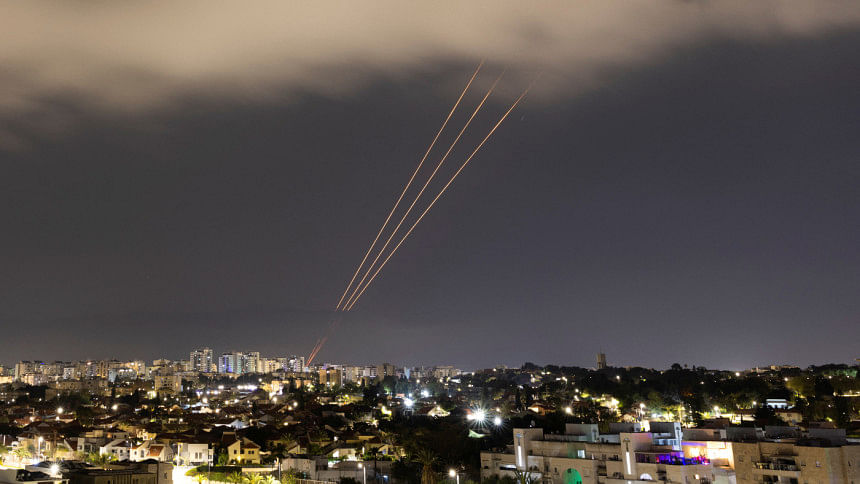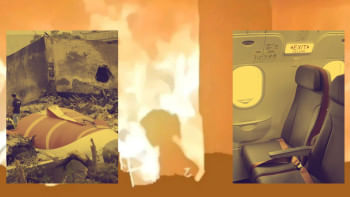The desert and the dream: Can the West remember how to hope?

The stark image on the Time magazine's recent cover lingers like dust on the tongue: Iran's ageing Supreme Leader, Ayatollah Khamenei, his visage eroding, crumbling into the barren sands of a vast, indifferent desert. It's a potent metaphor—perceived fragility, shifting foundations, time grinding icons into nothingness. Yet, gazing upon this calculated vision of decay from Western media, a more unsettling question arises: Has the West, so fixated on the crumbling edifice of others, forgotten how to build dreams of its own? Has it traded the soaring cathedral of collective aspiration for the bomb shelter of dystopian anxiety?
The accusation that the West has "forgotten to dream" points to the atrophy of grand, positive, unifying narratives that once propelled the planet. Recall the electrifying surge of the Space Race—humanity stepping onto the Moon, a triumph of audacious imagination made manifest. Think of the muscular optimism of post-WWII rebuilding: forging welfare states and institutions from rubble, fuelled by belief in progress and shared prosperity. These were collective stories, imbued with faith in the future's positive possibilities, achievable through concerted effort. They embodied positive futurism—not merely preventing catastrophe, but imagining desirable worlds. They hinted at transcendence, reaching beyond material comfort towards human betterment and exploration.
Step into today's landscape, however, and the air feels thinner, the horizons dimmer. The West navigates shadows. Popular imagination is saturated with dystopia: climate apocalypse, AI domination, societal collapse, zombie plagues. While often intended as warnings, their sheer volume creates a background radiation of despair, drowning out visions of a better world. This pessimism permeates Western political discourse, now reduced to perpetual crisis management—threats of terrorism, migration, adversaries; reactive scrambles over pandemics, inflation, polarisation, civil unrest. The electoral cycle shrinks the horizon to the next poll. Where is the soaring rhetoric for the next fifty years? Where is the leader articulating a future worth striving for—beyond mere survival?
The ground feels unstable. Economic realities—stagnant wages, yawning inequality, housing crises, evaporating mobility—have fostered entrapment and diminished expectations. The focus shifts from shared prosperity to security and retention. At the same time, techno-pessimism has replaced late-20th-century wonder. We see surveillance capitalism eroding privacy, social media fracturing minds, AI threatening jobs and agency. The digital promise has tarnished.
Francis Fukuyama's The End of History, flawed though it was, proclaimed liberal democracy's victory—a notion now in tatters. The West faces potent ideological challengers—Chinese authoritarianism, home-grown illiberal populism—while grappling with internal democratic decay. Confidence in the Western model as an aspirational endpoint has eroded. This is compounded by a palpable decline in trust in government, media, science, and religion—the scaffolding for shared dreams. Without belief in mediating structures, how can a shared future be forged?
Moreover, vital struggles for individual rights and identity justice, while essential for equity, can inadvertently fragment the collective gaze. The intense focus on specific redress, as necessary as it is, can render broad, unifying aspirations either impossible or suspect. And looming over all are the twin existential threats of climate catastrophe and nuclear annihilation—long, cold shadows under which ambition seems naïve.
Yet, declaring the Western dream extinct is to surrender to the despair we diagnose. Look closer. The most potent expression of collective yearning is the climate movement. Born of crisis, its calls for a Green New Deal go further: they are ambitious visions of radical transformation. It's a dream not just of survival, but of a cleaner, fairer, more sustainable world. A form of positive futurism, forged in necessity. Similarly, social justice movements embody powerful dreams of radically equitable, inclusive societies that actively shape culture.
Echoes of older ambitions persist, albeit altered. Space exploration rekindles—now billionaire-led endeavours to reach the Moon or Mars. Yet they feel more like elite, technocratic pursuits than galvanising public dreams. Niche techno-optimism lingers in Silicon Valley, dreaming of AI curing disease or delivering renewable abundance, often critiqued as naïve or elitist.
Perhaps the key shift is decentralisation. Grand, monolithic narratives are scarce, but countless grassroots dreams flourish: hyper-local community building, urban farming, cooperatives, open-source innovation, and sustainable living experiments. The dream lives on—fragmented, localised. In arts and culture, while dystopia reigns, subcultures nurture niche utopias. Solarpunk imagines lush, sustainable tech futures; visionary artists craft hopeful alternatives. Dreams are increasingly reframed as resilience and adaptation—less about conquering nature, more about building robust communities to weather complex storms.
This raises hard questions. Is this decline uniquely Western? China promotes its "Chinese Dream," India pulses with development narratives, Russia defies sanctions to build a sovereign economy, Africa buzzes with innovation. Yet all grapple with their own anxieties—inequality, environmental collapse, volatile politics. The human struggle for hope is universal.
Were past grand dreams unproblematic? Far from it. Enlightenment progress was entangled with colonialism and exploitation. American Manifest Destiny fuelled genocide. Uncritical techno-optimism ignored ecological limits. Their decline may be a necessary reckoning with those shadows. Their exclusivity and destructiveness make us wary of simplistic visions. Is dystopia inherently negative? Not always. It can be diagnostic—a stark mirror, a motivator for change. Focusing only on positive dreams risks dangerous escapism.
And the "small dreams"—of security, family, community, and meaningful work? Dismissing them is elitist; they are the bedrock of dignity. But a thriving civilisation needs both: proximate comfort and a transcendent horizon.
We must interrogate our systems. Does a media industry, fuelled by clicks from fear and outrage, suppress positive vision? Does late-stage capitalism—obsessed with short-term shareholder value, commodification, and endless growth on a finite planet—inherently stifle the long-term, collective imagination needed for better futures? The machinery grinds down our capacity to dream big.
Is there a generational divide? Are Gen Z and Alpha, raised amid climate warnings, precarity, and digital saturation, more pragmatic, focused on justice and sustainability as non-negotiable, sceptical of grandiose past promises? Or are they still searching for collective hope?
So, has the West forgotten to dream? The answer is both lament and recognition: it's a profound shift, not a void. The character of dreaming has transformed. Grand, unifying techno-utopian dreams have receded. In their place: defensive dreams that are focused on preventing catastrophe—climate collapse, democratic decay, pandemics. They are born of necessity, powerful, but reactive. Then comes fragmented dreams, a vibrant tapestry of localised aspirations—community resilience, social justice, and cooperatives. They are rich and vital, yet lacking a unifying thread. Then there are critical dreams born from critique—radical equity, restorative justice, and systemic transformation. They act like potent engines for change, yet struggle to articulate a purely positive, shared future.
Underlying all this is a crisis of confidence. Faith in inevitable progress, in institutions' capacity to deliver a better future for all, has been shaken. We face unprecedented complexity: the Gordian knot of climate change, staggering inequality, tech disruption, geopolitical instability, democratic fragility. Grand dreams can feel like castles on sand in an earthquake zone.
Yet, the capacity persists, in the climate movement's urgency, social justice's moral force, grassroots builders' quiet persistence. The potential for renewal is real. The crucial question: can these diverse, often defensive or fragmented strands converge? Can the West weave nuanced, inclusive, compelling visions—not escapist fantasies, but realistic pathways towards something better? Dreams that promise not just survival, but flourishing?
The Time magazine's cover showed an image dissolving into sand. The challenge is not merely to mourn decay, but to remember how to dream in sandcastles. To envision structures of hope that point towards a horizon worth reaching. To reclaim positive futurism—not as denial, but as the essential light for navigating darkness. Our future depends on diagnosing the desert and rediscovering the collective will to imagine, and build, the oasis. The dream isn't dead; it's dormant – waiting for a narrative bold, inclusive, and honest enough to awaken it.
Zakir Kibria is a writer and policy analyst. He can be reached at [email protected].
Views expressed in this article are the author's own.
Follow The Daily Star Opinion on Facebook for the latest opinions, commentaries and analyses by experts and professionals. To contribute your article or letter to The Daily Star Opinion, see our guidelines for submission.

 For all latest news, follow The Daily Star's Google News channel.
For all latest news, follow The Daily Star's Google News channel. 










Comments